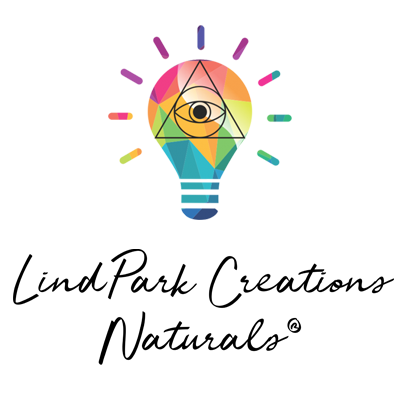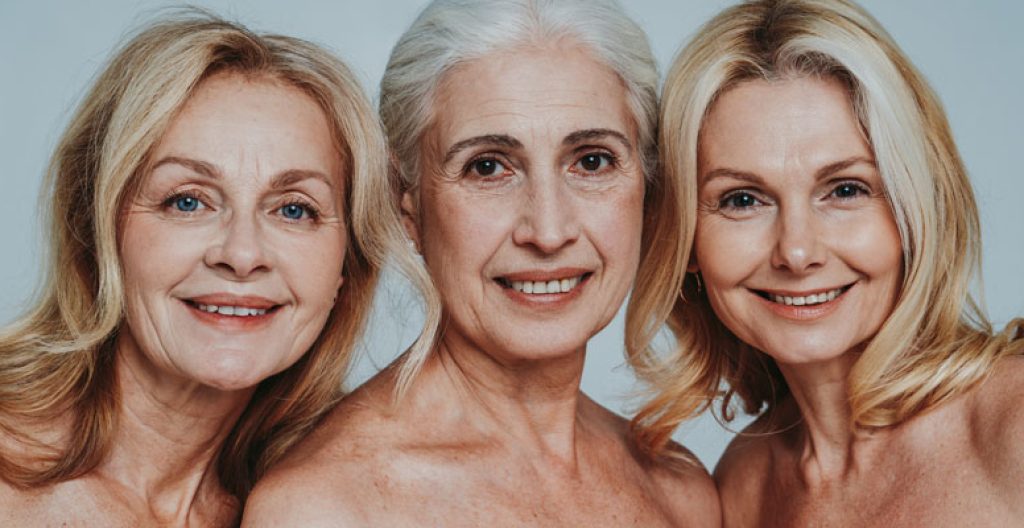Husbands and partners listen up!
Good news in the menopause arena! And it’s NOT HRT!
The safety of HRT has been linked to major diseases such as stroke, heart attack and ovarian cancer.…so why would you do it?
“But I’ve been given bio-identical hormones”….well, if these are synthetic hormones made in a laboratory, they can promote cancer. They only benefit big Pharma….who by the way regularly falsify research as they rake in the billions.
The synthetic progestins heavily promoted in hormone replacement therapy have undergone molecular alterations at unusual positions. As these strange, not-found-in-nature molecules travel down the hormone pathways, they occupy progesterone receptor sites, create actions different from natural progesterone, cannot be used as precursors of other hormones (as natural progesterone can), and are difficult for the body to metabolise and excrete. These molecular alterations carry potential undesirable side effects.
Frightening Side Effects
Synthetic progesterones are not all alike, and people are not all alike. It’s always wise to read the Consumer Product Information slips which are inserted in the packaging of medicines. Some of the side effects are frightening.
The “Physicians Desk Reference (PDR)” pages for medroxyprogesterone acetate, claims potential side effects from loss of vision to stroke, heart attack, liver disease and pulmonary embolism. Precautions include: may cause fluid retention, migraine, asthma, depression, and thrombotic disorders.
I’ve been through menopause…and even though I’m one of the lucky ones, having a herbal dispensary at my disposal, supplements galore, everything I could possibly need, I still may feel the highs and lows hormonally and get caught off-guard.
So the right herbal medicine and also paired with Lindpark Creations Naturals “Wild Yam Cream” comes in very handy, to help women through this transitional phase in their lives, which is vital and could even be the glue that holds the family together!
So my latest formula is for the following women:
1. Peri-menopausal – Usually around their forties, periods slow down or become irregular, emotional rollercoaster, maybe the beginning of hot flushes or night sweats, general weight gain, brain fog, even acne and increased hair in places you don’t want it.
There is declining levels of oestrogen and progesterone, as ovarian synthesis of these steroid hormones dramatically reduces.
2. Menopausal – The period has stopped and you maybe suffering from low energy, low libido, dry vagina, dry skin, wrinkling skin, depression, anxiety, night sweats, alopecia or thinning hair, migraines, hot flushes, memory loss, constipation, weight gain around the midline, osteoporosis, cardiovascular disease and more!
MENO-EASE
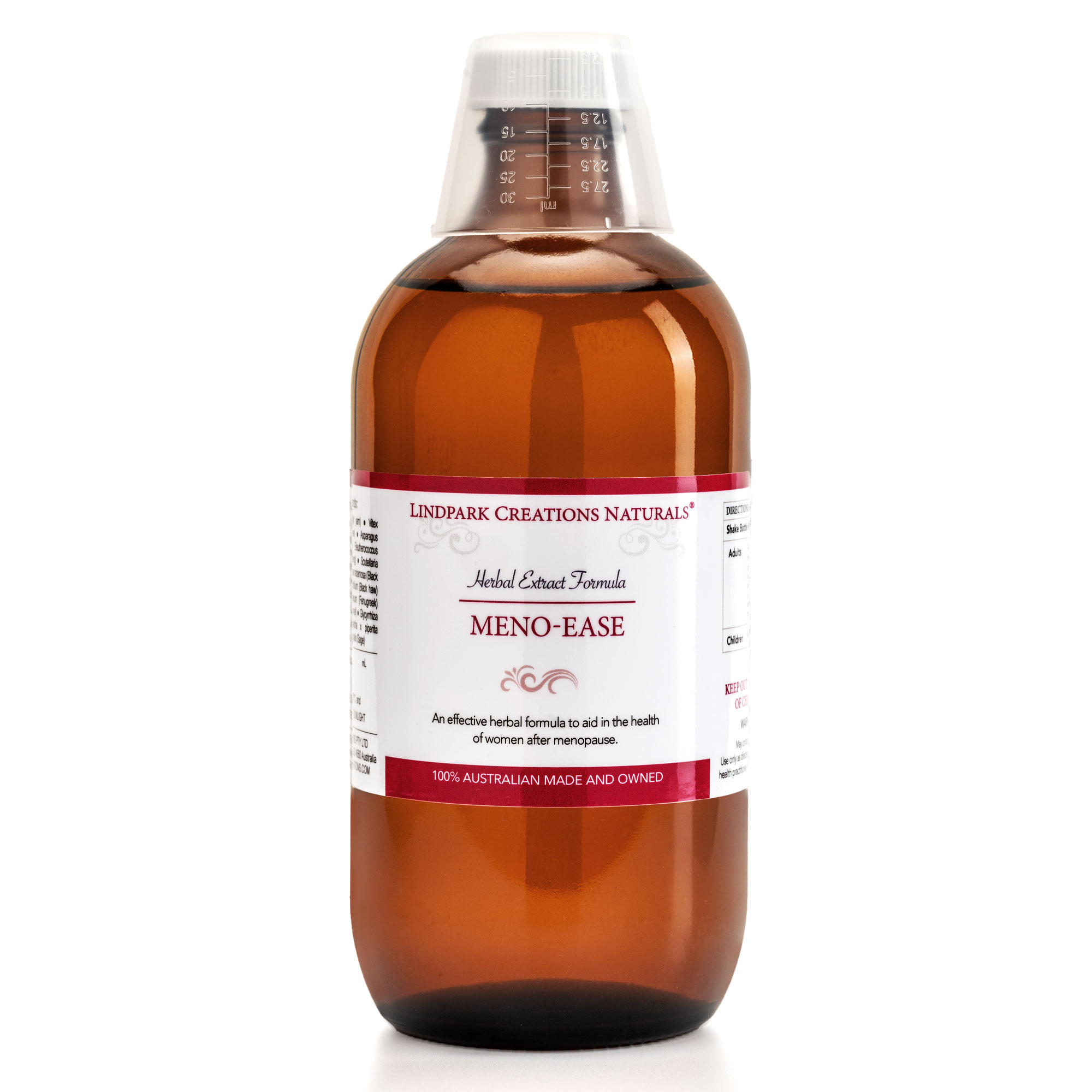
MENO-EASE HERBAL TINCTURE 200mL/500mL
What’s In it and How Can It Help
| Dioscorea villosa | (Wild yam) | Contains Diosgenin a plant sterol that boosts the body’s natural progesterone levels and helps balance oestrogen |
| Vitex agnus-castus | (Chaste tree) | Boosts the body’s natural progesterone level by acting on the pituitary gland. Applicable for PMS symptoms and other symptoms occurring in the second half of the cycle but also for menopausal symptoms. |
| Asparagus racemosa | (Shatavari) | An adaptogenic herb that tones the reproductive organs, boosts libido and reducing menopausal symptoms as well as supporting the immune system. Helps the body release serotonin which may also reduce hormonal headaches. |
| Eleutherococcus senticosus | (Siberian ginseng) | It’s adaptogenic properties help reduce stress, anxiety and depression. It increases energy and endurance whilst improving brain and cardiovascular health. |
| Scutellaria lateriflora | (Skullcap) | Relaxes nervous tension. Eases PMS. Reduces cortisol. |
| Actaea racemosa | (Back cohosh) | Traditionally used by Native Americans, to normalise the female reproductive system and relaxes the nervous system. Relieves ovarian cramps, reduces hot flushes and balances mood swings. |
| Viburnum prunifolium | (Black haw) | Relaxant of the uterus, hypotensive and sedative. |
| Trigonella foenum-graecum | (Fenugreek) | A lymphatic tonic, helping reduce infections and toxins. Reduces inflammations and tumours. |
| Foeniculum vulgare | (Fennel) | A carminative that reduces bloating and spasms. Reduces flatulence and colic. |
| Glycyrrhiza glabra | (Licorice) | Anti-inflammatory, and adrenal agent, having a marked effect on the endocrine system, supporting the adrenal glands. |
| Mentha x piperita | (Peppermint) | As a nervine it eases anxiety, tension and hysteria, reduces intestinal colic, flatulence and dyspepsia. |
| Salvia officinalis | (Sage) | Anti-hidrotic, helping subdue excessive perspiration and heat induced flushes. |
Researchers suggest menopausal symptoms may be due to a deficiency in DHEA. 25% of menopausal women have been found to have high levels of DHEA and have no clinical symptoms of menopause.[7]
Menopausal symptoms are also linked to elevated cortisol production from the adrenal glands. Therefore, menopausal symptoms can be seen to be related to a profile of increased cortisol and reduced DHEA, indicating that adrenal dysfunction is a key component of the disorder and of the treatment!
This is why our Wild Yam, Chaste Tree and Castor Oil Herbal Cream works so well. Absorbed into the skin, it affects the adrenal hormone pathway to boost natural progesterone levels and balance out oestrogen. This in turn can relieve anxiety, improve memory, protect brain cells and even prevent epileptic seizures. It can increase the tone of blood vessels and improves the efficiency of the heart. It also reverses many of the signs of ageing in the skin and promotes healthy bone growth. We wouldn’t be without this cream.
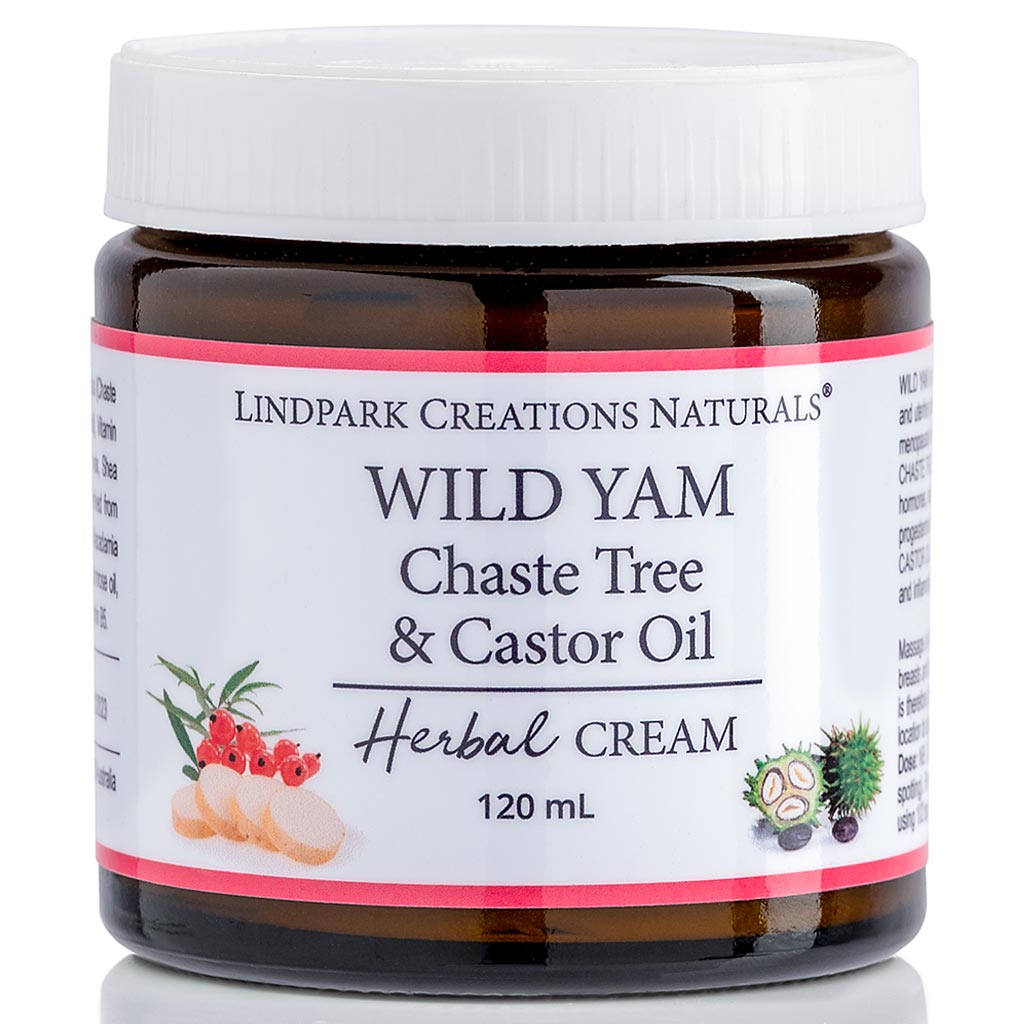
Herbal medicines can promote normal physiological oestrodiol production for the woman’s age and also support the adrenal function and balance neurotransmitters to achieve an asymptomatic hormonal transition.
The key neurotransmitters identified to influence thermoregulation are:
1. Noradrenaline
Catecholamines such as noradrenaline (NA) are released in stressful situations, and clinically we know that stress is a common trigger for hot flushes.
Additionally, herbs which block the release of NA reduce the incidence of hot flushes in symptomatic women.
2. GABA
Hypothalamic NA levels have also been found to be attenuated by the neurotransmitter gamma- aminobutyric acid (GABA). GABAnergic agents have been demonstrated in clinical trials to be significantly superior to a placebo for reducing the incidence and severity of hot flushes,[highlighting that promoting GABAnergic actions is an effective therapeutic action.
3. Serotonin
Serotonin is known to reduce the tendency to hot flushes. Oestrogen increases the availability of serotonin in the hypothalamus by increasing the synthesis of serotonin and slowing its degradation. A reduction in serotonin in the hypothalamus during peri-menopause is thought to lower the upper threshold, and the use of selective serotonin re-uptake inhibitors (SSRIs) has been found to reduce hot flushes by 65%.
The transition to menopause has been found to be associated with increased levels of urinary cortisol and women who experience the most severe hot flushes and menopausal symptoms have the highest amount of urinary cortisol.
Moreover, researchers suggest that the excessive cortisol seen in symptomatic menopausal women may be driving the increased incidence of cardiovascular disease, osteoporosis, visceral obesity, insulin resistance, and depression.
Studies have repeatedly shown that a woman’s risk for depression is significantly increased during the menopausal transition.
The experience of the menopausal transition and negative life events that commonly occur for women during the transition may contribute to the stress. For example, menopausal depression is associated with a reduced sense of control over their lives and their experience of menopause.
Additionally, several stressful life events are linked to menopausal depression, such as children leaving home, marital breakdown, and death of parents. Considering the significant changes and life events that often occur during this period of women’s lives, it is not surprising that elevated cortisol occurs.
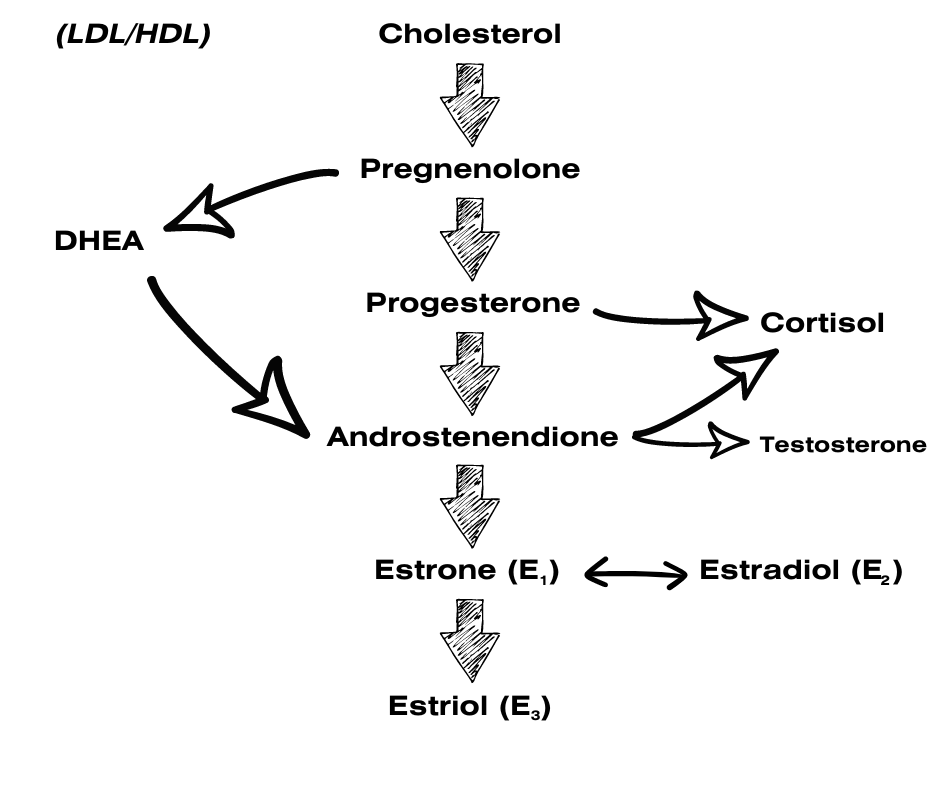
Finally, do not allow an uninformed doctor to persuade you to go on an extreme cholesterol-lowering diet, nor put you on killer cholesterol-lowering drugs. Judging by the way most physicians have embraced the cholesterol-is-evil propaganda, they never learned or have forgotten the following:
- All of the sex hormones are derived from cholesterol!
- All of the steroid hormones, which help us deal with stress, inflammation and injury, are derived from cholesterol!
- Cholesterol is required for brain function!
- LDL is extremely good because it is used as a source for producing progesterone and DHEA.
So finally, there is always a herbal natural solution to any transitionary time in life and menopause is no different.
Our Meno-Ease Herbs along with our Wild yam, Chaste tree & Castor oil cream work perfectly to support your body through this difficult time, with ease and grace.
